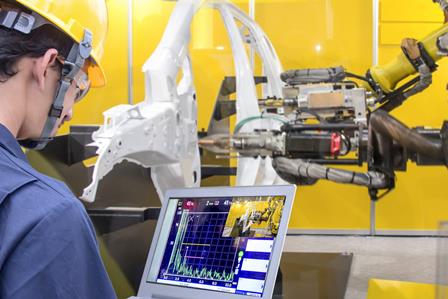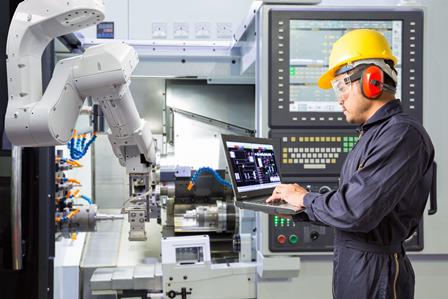Course Overview
This professional development course is designed for engineers and technicians who need to harness machine learning technologies in their engineering work or become better problem solvers through the application of machine learning. This course will teach you to use Python Programming to work with machine learning applications and to apply supervised and unsupervised machine learning to engineering problems.
Course Benefits
- You may be eligible to claim CPD points through your local engineering association.
- Receive a Certificate of Completion from EIT.
- Learn from well-known faculty and industry experts from around the globe.
- Flexibility of attending anytime from anywhere, even when you are working full-time.
- Interact with industry experts during the webinars and get the latest updates/announcements on the subject.
- Experience a global learning with students from various backgrounds and experience which is a great networking opportunity.
- Learn to use Python Programming to work with machine learning applications and to apply supervised and unsupervised machine learning to engineering problems.
- Study the fundamentals of Machine Learning and Artificial Intelligence and its applications to solve practical engineering problems by using Python language.
- Understand the fundamentals of Linear Algebra with Python and cover the concepts of Anaconda, Pandas and Numpy.
- Gain experience in solving practical problems like the Industrial Knowledge Representation using Decision Trees, Industrial Fault Diagnosis using Feedforward Neural Networks and much more.
Course Details
Machine learning is undoubtedly one of the most exciting technologies in recent times. Both large and small companies are embracing it with tremendous results. If you are keen to harness machine learning technologies in your engineering work, become a better problem solver, or are perhaps considering a career in machine learning, then this program is for you.
There are many programs out there, but this one focuses on engineering and industrial applications.
The best way to learn the technologies is to work through practical examples of machine learning in a systematic way. Two types of machine learning will be tackled in this program: supervised learning and unsupervised learning.
Supervised learning is where we learn the relationship of given inputs to a set of outputs. For example, how different sensor inputs for a process plant can predict the likelihood of a breakdown of a pump or requirement for maintenance on an item of equipment. You already know how to classify the earlier input data to previous breakdowns of the pump; so, you want to use new input data to predict this event so that you can act before it actually happens. Algorithms that you will learn about here include linear regression, logistic regression, discriminant analysis, decision trees, Naïve Bayes, support vector machines, and random forests.
Unsupervised learning occurs when there is no pre-defined relationship between input data and an output variable. An example here would be to take sensor data from hundreds of similar industrial plants, then asking the algorithm to find patterns and classify the data. You want your algorithm to find any patterns and to do the classification of the data for you. Algorithms that you will learn about here include K-means clustering and Gaussian Mixture models.
The course is composed of 12 modules, covering topics such as basic machine learning terminology and processes, as well as how to implement machine learning to solve your engineering problems using the Python language.
Module 1: Basic Machine Learning Terminology
- Machine Learning and Artificial Intelligence
- Supervised Learning
- Unsupervised Learning
- Reinforcement Learning
- Building a Machine Learning System
- Evaluating a Machine Learning System
Module 2: Linear Algebra with Python using Numpy and Pandas
- Linear Algebra Review
- Introduction to Anaconda
- Introduction to Pandas
- Introduction to Numpy
- Linear Algebra using Numpy
Module 3: Probability Theory and Statistics with Python using Numpy and Pandas
- Data Plotting in Python
- Statistics
- Probability and Random Variables
- Useful Probability Distributions
- Derivatives
Module 4: Feature Engineering
- Data Loading and Manipulation using Pandas and Numpy
- Working on Images
- Features and Feature Vectors
- One-hot Encoding
- Feature Normalization
Module 5: Unsupervised Learning
- Clustering using K-means Algorithm
- K-Means Implementation
- Clustering using Expectation-Maximization
- Association Rules and Recommender Systems
Module 6: Supervised Learning
- Classification
- K-Nearest Neighbors Algorithm
- Gaussian Mixture Models
- Decision Trees
- Regression
- Local Mean
- Regression Trees
- Linear Regression
Module 7: Feedforward Neural Networks
- Mathematical Neural Models
- The Perceptron
- The Gradient Descent Algorithm
- Multi-Layer Perceptron
MODULE 8: Convolutional and Recurrent Neural Networks
- Deep Neural Networks
- Convolutional Neural Networks
- Recurrent Neural Networks
MODULE 9: Natural Language Processing – Part I
- Problems Solved by Natural Language Processing
- Text Preprocessing
- Regular Expressions
- Discrete Features
MODULE 10: Natural Language Processing – Part II
- Word Embeddings
- Part of Speech Tagging
- Text Classification using Naïve Bayes
- Text Classification using Neural Networks
MODULE 11: Practical Applications
- Industrial Knowledge Representation using Decision Trees
- Industrial Fault Diagnosis using Feedforward Neural Networks
- Sound Classification using Feedforward Neural Networks
- Image Classification using Convolutional Neural Networks
- Machine Translation and Chatbots using Recurrent Neural Networks
MODULE 12: Web Deployment
- Use of Flask
- Integrating machine learning models with Flask
- Deploying applications to a Web Server
To obtain a certificate of completion for EIT’s Professional Certificate of Competency, students must achieve a 65% attendance rate at the live, online fortnightly webinars. Detailed summaries/notes can be submitted in lieu of attendance. In addition, students must obtain a mark of 60% in the set assignments which could take the form of written assignments and practical assignments. Students must also obtain a mark of 100% in quizzes. If a student does not achieve the required score, they will be given an opportunity to resubmit the assignment to obtain the required score.
For full current fees in your country go to the drop down filter at the top of this page or visit the Fees page.
Payment Methods
Learn more about payment methods, including payment terms & conditions and additional non-tuition fees.
You are expected to spend approximately 5-8 hours per week learning the course content. This includes attending fortnightly webinars that run for about 90 minutes to facilitate class discussion and allow you to ask questions. This program has a 65% attendance requirement in the live webinars in order to graduate from the program. If you are unable to attend the live webinars, you have the option of watching the recording of completed webinars and sending a summary of what you have learnt from the webinar to the Learning Support officer. The summaries go towards your attendance requirement for the program.
This program is run online on an intensive part-time basis and has been designed to fit around full-time work. It will take three months to complete.
We understand that sometimes work commitments and personal circumstances can get in the way of your studies, so if at any point you feel that you are struggling with the pace of the course or finding a particular module challenging, you are encouraged to contact your designated Learning Support Officer for assistance.








